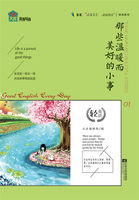But whatsoever he hath said concerning me, I make no account at all thereof, because he spake it in his drunkennesse, and as freely as I forgive him, even so (good Mother and kinde Brethren,) let mee entreate you to do the like.
When the Mother had heard these words, and confidently beleeved her Daughter: she began to torment her selfe with anger, saying.By the faith of my body Daughter, this unkindnesse is not [to] be endured, but rather let the dogge be hanged, that his qualities may be knowne, he being utterly unworthy, to have so good a woman to his wife, as thou art.What could he have done if he had taken thee in the open more, and in company of some wanton Gallants? In an unfortunate houre wast thou married to him, base jealous Coxecombe as he is, and it is quite against sense, or reason, that thou shouldest be subject to his fooleries.What was hee, but a Merchant of Eale-skinnes or Orenges, bred in some paltry countrey village; taken from Hogge-rubbing; clothed in Sheepes-Sattin, with Clownish Startops, Leather stockings, and Caddies garters: His whole habite not worth three shillings: And yet he must have a faire Gentlewoman to his Wife, of honest fame, riches and reputation; when, comparing his pedegree with hers, hee is farre unfit to wipe her shooes.
Oh my deare sonnes, I would you had followed my counsell, and permitted her to mate in the honourable family of Count Guido, which was much mooved, and seriously pursued.But you would needs bestow her on this goodly jewell; who, although shee is one of the choysest beauties in Florence, chaste, honest and truely vertuous: Is not ashamed at midnight, to proclaime her for a common whore, as if we had no better knowledge of her.But by the blessed mother of Saint John, if you would be ruled by mine advise; our law should make him dearely smart for it.
Alas my sonnes, did I not tell you at home in our owne house, that his words were no way likely to prove true? Have not your eyes observed his unmannerly behaviour to your Sister? If I were as you are, hearing what he hath said, and noting his drunken carriage beside; I should never give over, as long as he had any life left in him.And were I a man, as I am a woman, none other then my selfe should revenge her wrongs, making him a publike spectacle to all drabbing drunkards.
When the brethren had heard and observed all these occurrences; in most bitter manner they railed on Arriguccio, bestowing some good bastinadoes on him beside, concluding thus with him in the end.
Quoth one of them, Wee will pardon this shamefull abusing of our Sister, because thou art a notorious drunkard: but looke to it (on perill of thy life) that we have no more such newes hereafter; for, beleeve it unfainedly, if any such impudent rumours happen to our eares, or so much as a flying fame thereof; thou shalt surely be paide for both faults together.
So home againe went they, and Arriguccio stood like one that had neither life or motion, not knowing (whether what he had done) was true, or no, or if he dreamed all this while, and so (without uttering any word) he left his Wife, and went quietly to bed.Thus by her wisdome, she did not onely prevent an imminent perill: but also made a free and open passage, to further contentment with her amourous friend, yet dreadlesse of any distaste or suspition in her Husband.
THE SEVENTH DAY, THE NINTH NOVELL
WHEREIN IS DECLARED, THAT GREAT LORDS MAY SOMETIME BE DECEIVED BYTHEIR WIVES, AS WELL AS MEN OF MEANER CONDITIONLydia, a Lady of great beauty, birth, and honor, being Wife to Nicostratus, Governour of Argos, falling in love with a Gentleman, named Pyrrhus; was requested by him (as a true testimony of her unfeigned affection) to performe three severall actions of her selfe.She did accomplish them all, and imbraced and kissed Pyrrhus in the presence of Nicostratus; by perswading him, that whatsoever he saw, was meerely false.
The Novell delivered, by Madame Neiphila, seemed so pleasing to all the Ladies; as they could not refraine from hearty laughter, beside much liberality of speech.Albeit the King did oftentimes urge silence, and commanded Pamphilus to follow next.So, when attention was admitted, Pamphilus began in this order.I am of opinion, faire Ladies, that there is not any matter, how uneasie or doubtfull soever it may seeme to be; but the man or woman that affecteth fervently, dare boldly attempt, and effectually accomplish.And this perswasion of mine, although it hath beene sufficiently approved, by many of our passed Novels: Yet notwithstanding, I shall make it much apparent to you, by a present discourse of mine owne.Wherein I have occasion to speake of a Lady, to whom Fortune was more favourable, then either reason or judgement, could give direction.In which regard, I would not advise any of you, to entertaine so high an imagination of minde, as to tracke her footsteps of whom I am now to speake: because Fortune containeth not alwayes one and the same disposition, neither can all mens eyes be blinded after one manner.And so proceed we to our Tale.
In Argos, a most ancient Citie of Achaya, much more renowned by her precedent Kings, then wealth, or any other great matter of worth: there lived as Lieutenant or Governour thereof, a Noble Lord, named Nicostratus, on whom (albeit hee was well stept into yeares)Fortune bestowed in marriage a great Lady, no lesse bold of spirit, then choisely beautifull.Nicostratus, abounding in treasure and wealthy possessions, kept a goodly traine of Servants, Horses, Houndes, Hawkes, and what else not, as having an extraordinary felicity in all kinds of game, as singular exercises to maintaine his health.















